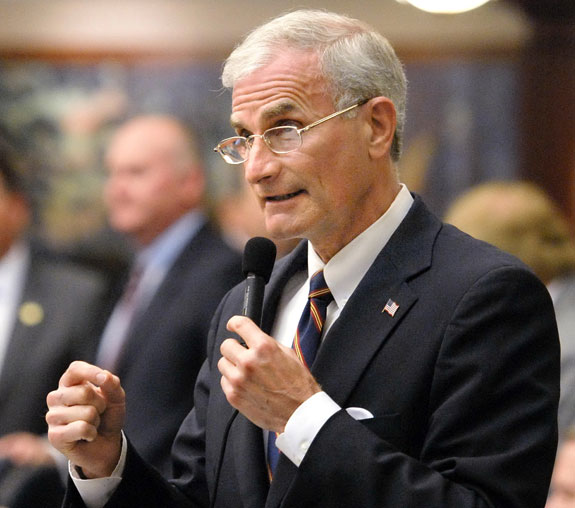
Pasco County Tax Collector Mike Fasano is tired of the “irresponsible actions of our legislators which led to the budget breakdown in Tallahassee.”
By Francisco Alvarado
Florida Center for Investigative Reporting
A week ago, Florida’s House of Representatives abruptly ended the 2015 legislative session to protest the state senate’s demands that the legislature discuss expanding Medicaid under Obamacare. Neither legislative body is backing down and even a special session may not resolve the impasse. “This is uncharted territory,” said Jorge Luis Lopez, a Coral Gables-based government affairs attorney and Republican Party fundraiser. “Is the House leadership willing to shut down the government? I doubt it. But it is difficult to read how this all gets resolved.”
Meanwhile, Gov. Rick Scott is meeting with U.S. Health and Human Services Secretary Sylvia Mathews Burwell in Washington D.C. today in a long shot attempt to renew a $2.2 billion hospital funding program in Florida. Convincing Mathews will be difficult considering Scott is suing the federal government, alleging the Obama administration is trying coerce the state into expanding Medicaid by eliminating the low income pool that covers hospital bills for uninsured patients.
Amid the uncertainty, local government officials are growing increasingly frustrated with the historic levels of obfuscation coming from the Capitol Complex in Tallahassee.
In Pasco County, Tax Collector Mike Fasano pondered a very Floridian nightmare: long lines of angry customers who can’t get driver licenses or vehicle tags renewed because his employees can’t access the Department of Motor Vehicles due to a government shutdown on July 1, the start of the new fiscal year.
In a letter to state highway safety chief Terry Rhodes obtained by the Tampa Bay Times, Fasano asks what he is supposed to do in the event of a fiscal apocalypse:
“I fully intend to open our office doors on July 1, budget or no budget. However, if July 1st dawns and there is no state budget in place, how will this fact impact tax collector offices, such as Pasco County, that provide drivers license, tag and title services? Even though we will be open and prepared to serve our customers on July 1st, will there be any services in Tallahassee to connect to?
Are there dollars within your department to ensure that our customers can continue to be served into the next fiscal year? What contingency plans are in place to ensure the continuity of service beyond June 30, 2015?”
Fasano, a former state legislator who chastised the current crop of Tallahassee politicians in his letter, warned Rhodes to prepare for an “unprecedented situation come July 1.”
“I need to know what to advise our customers, as well as prepare our staff for the potential shutdown of services no matter how long or brief that shutdown may be,” Fasano wrote. “Any information and guidance you can give would be most appreciated.”
School district officials around the state are also scratching their heads on how to prepare for the looming crisis.
In a joint Tampa Bay Times/Miami Herald story, Broward County Superintendent Robert Runcie called the budget impasse “a huge problem,” Pinellas schools superintendent Mike Grego described it as “exceedingly difficult,” and Pasco County superintendent Kurt Browning said, “We can’t spend money we don’t have.”
Runcie said the Tallahassee stalemate delays funding decisions on what programs schools can offer and how many teachers to hire. “The only thing we can do now is go on last year’s budget, which means zero new investment in public schools,” Runcie told the Times/Herald.
Even special interest groups took a hit as a result of the stalemate between the house and senate. The house shut things down before passing bills creating a new municipal utility bond program and expanding the powers of Florida Development Finance Corporation, the entity that wants to provide tax-free financing for $1.75 billion on behalf of All Aboard Florida’s train project from Orlando to Miami, according to The Bond Buyer.
The house also adjourned before renegotiating a new gambling deal with the Seminole Tribe of Florida, which has agreed to pay the state more than $100 million in exchange for exclusive rights to offer banked card games, such as blackjack. The house also didn’t vote on an amendment attached to a bill that would have given state-tax dollars to four stadium projects, including renovations at Sun Life Stadium in Miami-Dade County.
